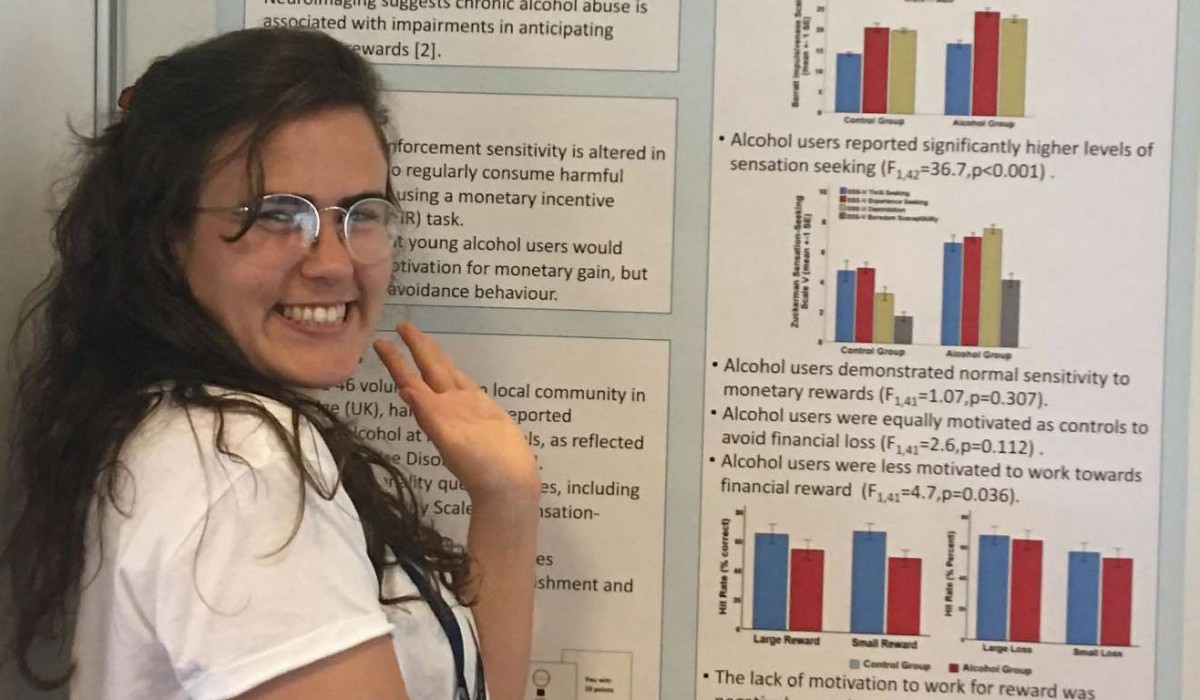Her research targets patients with alcohol and cannabis dependency showing reduced sensitivity to tasks involving reward gain and loss avoidance.
Hi, I’m Jess and I’m a third-year graduate entry medical student. I previously studied Biomedical Sciences and I’ve got a strong interest in neuroscience and mental health. I enjoyed research into neurodegenerative diseases, but I have recently transitioned my interests to psychiatry with a focus on depression, anxiety and addiction.
I have absolutely loved my time at Lucy Cav to date and chose to live in Strathaird my first 2 years. It’s got a great community and supportive, open vibes. I am such a fan of the beautiful gardens in summer, particularly with yoga on the lawn! I am still an active member of Lucy Cav-Hughes Hall joint netball team!
At the European College for Neuropsychopharmacology’s (ECNP) 2019 conference in Copenhagen, I was presenting research I’d conducted with Dr Karen Ersche at Cambridge University’s Department of Psychiatry. Our project was based on previous research findings that patients with alcohol and cannabis dependency show reduced sensitivity to tasks involving reward gain and loss avoidance. This has implications for treatment, as many rehabilitation programmes will give or withdraw privileges depending on compliance. Extensive research demonstrating this is an ineffective treatment strategy for patients with dependency highlights our need for novel approaches.
My project was interested to see if this 'altered gain/loss sensitivity' presented itself early in disease processes – i.e. in chronic alcohol users who regularly drank harmful amounts but did not yet meet criteria for dependency. This was particularly topical as the majority of our sample population were Cambridge University students! We found it interesting to observe that in this young population, there was a reduction in motivation to work for reward, but not in loss avoidance behaviour. The observed effect was directly related to alcohol use severity and may suggest reinforcement sensitivity changes occur at early stage in chronic alcohol use.
I’m incredibly motivated by this field because there are currently poor treatment outcomes for patients with substance dependency and we fundamentally need to do better in clinical practice. I had clinicians approach me at the conference to report that they had observed their patients respond poorly to ‘carrot and stick’ methods of treatment and how promising it was that there was finally data to support their anecdotal evidence. Accumulation of similar findings will encourage the current best practice guidelines to be updated and patient care to be improved. My project may progress to be clinically translatable as, with future research, altered reward sensitivity may provide a suitable target for early intervention – stopping addiction in its destructive path.
My priorities in the near future are to continue contributing to this fascinating area of research and I will soon be investigating alternative treatments for depression with Imperial College London. I hope in the future to study the interplay between depression, anxiety and substance misuse.




